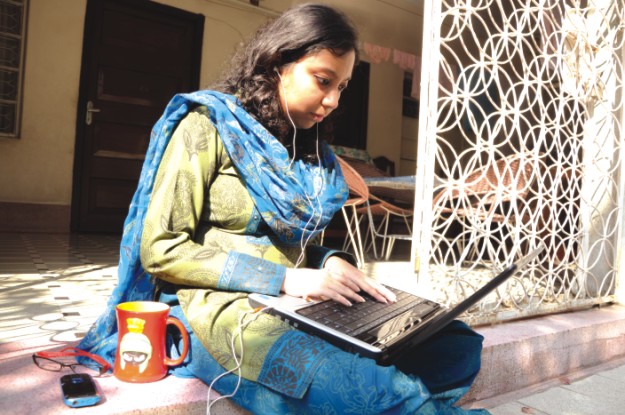| Spotlight
Ushering in
New-Age Ideas
Sameeha Suraiya
Cover photo: Yamin Tauseef Jahangir

We feel the necessity to put up our comments and ideas for the world to see.
They once had messengers on horses, who did little justice to a rapidly changing country. They agreed on switching to ships and telegraph cables, which happened to be no match for the world that was transforming at a maddening speed. In today's world of 24-hour news, the Internet telephones and twitter, the pace at which information is relayed has reached remarkable heights. Needless to say, the Internet has shrunk all notions of time and distance as we see the world get on by sitting from any corner of the globe. A message can now travel at the speed of light, but this does not mark the end of our technological advancement. With gadgets and software outdoing each other everyday, the need to stay globally connected is no longer just a fad. Like it or loathe it, the Internet is a force; the technologically challenged is as influenced by the benefits of the Internet as the tech-savvy.
Bangladesh is no alien to the wonders of the web. From catching daily updates of a flood-hit region to online shopping, the Internet truly makes one feel like a citizen of the world. Combining speed and reliability, it is a haven for businesses and other jobs that thrive on global clienteles. In the last two years, the communication sector of Bangladesh has changed dramatically, with over 650,000 people having access to Internet, as recorded by World Bank. The present government's manifesto, entitled “a charter for change”, especially its 'Visions 2021' which envisions a digital Bangladesh had attracted many young voters, which clearly shows the value that the younger generation places on information and communication technology. This huge implementation concept calls for changes in both urban and rural areas, a promise that Bangladeshis eagerly count on. Even disregarding the buzzword 'digital Bangladesh', we would be no less affected by the hype of online activities and its many marvels. To increase work efficiency, many international companies outsource their daily operations to our country whereupon specialised Bangladeshi men and women deal with them before relaying the information back. Such jobs include call-centre services, payroll and other data entry services. There are other job opportunities that are lesser known but attract a growing number of Bangladeshi youth, which involve writing online reviews for a particular brand product, for instance, electronics.

Events around the world are seen and read as they happen.
Mohibuzzaman Zico, a graduate of Computer Science, has worked in coding and setting up repositories for an integrated library system at BRAC. Now working as a consultant at JhoroTek, an IT firm, Zico creates news streaming servers designed for cell phones in collaboration with NTV, RTV, Grameen and other cellular service providers in the country. Zico also earns from home for an American based company. He engages in problem solving, testing and developing software as well as freelancing. He considers it a satisfactory work opportunity as he gets paid doing what he enjoys from the comfort of home. The recruitment procedure is also very straightforward where a test is carried out online followed by an interview, usually via Skype. Zico believes that Bangladesh has the skills but there is still a long way to go, “The whole setup is expensive.
A weak infrastructure and costly internet connectivity pose as the two biggest problems that people working in this industry face”.
 |
Nearly all workplaces today demand high speed
Internet to stay in touch with the rest of the world. |
Call centres, a recent addition to career option in Bangladesh, is another job that depends on global connectivity. A comparatively well-paid job for the minimum qualification it requires, call centre is an attractive opportunity for high school and university students. International call centres set higher standards as speakers are required to have sound command over the English language. The training that one undergoes for an international call centre is more intensive compared to the domestic ones. Jawad Chowdhury, a university student, works for a call centre, outsource for an Indian company called Helios, an extension of a UK based phone network, after three months of rigorous training and several rounds of interviews. Since he applied for the post of a brand ambassador, he is required to convince people, all residing in the UK, to buy particular cell phone contracts. The destination from where a call is made is never disclosed, for which people like Jawad receives training to improve their accent and emulate certain traits of British English. Also, to gear up their marketing skills, Jawad remembers how, during his interview, he was given the task to use all the tricks of the trade if he had to sell things as unusual as a guitar without strings, flying shoes, and even colourless lipsticks for men. In his words, “call centres like mine are great places to work in for a student but be prepared to work at unusual hours. They pay well and there are incentives too.”
Our ancestors had no inkling of a possible world where news would take split seconds to travel right inside our homes - on the TV screen, laptop or cell phone. The first images of Taj Hotel bombing in Mumbai in 2008 were caught by hostages on their cell phones, which took a matter of seconds to reach the entire world. It goes without saying that sharing of information is what we do in every waking hour in order to keep our grips on our world. News channels and newspapers all deliver the latest breaking news on their online versions, complete with in-depth comment and analysis. So fast and complete is the news that people, especially those working at different corporate houses where tasks are mostly carried out over the net, find it more convenient to read and see stories as they happen with a press of a button. Nafid Imran Ahmed, IT Strategist & In-charge, Online Edition and IT Page of The Daily Star sees a day when print media might be replaced by their online counterpart. While comparing between the print and online versions of The Daily Star, he says that on a daily basis, the number of times the newspaper gets viewed online is more than twice as the circulation of the print edition. It is the general thought that the online edition of our newspapers is mostly followed by readers living abroad but Ahmed states different, “I have seen a complete shift in the reader demographic. 75-80% of our online readers are based in Bangladesh”. Taking into consideration the present generation that finds it easier to follow news online, he says, “Our idea is to be present at all possible platforms and for you to be able to carry it in your pocket. Today everything is about miniaturization; The Daily Star widget on Nokia phones is our latest endeavour for you to see news as it happens”.
Bdnews24.org, the first online news portal in Bangladesh providing around the clock news brought a competitive edge to news broadcasting in Bangladesh. Hasan Ameen, a recent graduate working as Trainee Broadcast talks about the work that he does. Selecting contents from online news sources, he compiles them and after editing, Ameen reads out the news for Grameen Phone news service, a collaboration of bdnews24.
In many foreign countries, working from home is part of the trend of “making money online”, sometimes simply referred to as MMO. Stay-at-home moms have been greatly benefited from this. From creating databases for products to be sold to taking surveys or freelance writing, finding a legitimate online business is becoming one of the best ways to earn an extra income.
Cashing online is, however, still new to Bangladesh but the few fortunate ones who have made the leap seem to share the belief that the day is not too far away when Bangladesh too, is hit by the work-at-home trend. Sites like odesk.com hires writers to write reviews of the latest gadgets. Upon fitting a certain criteria for the job, a writer working from any corner of the world, gets paid according to the length of an article he submits. Payment is received through PayPal, an online banking, or sometimes directly into their personal bank accounts.
 |
Jawad Chowdhury uses his marketing
skills to convince foreign cell phone users. |
Blogging can still be considered a craze amidst the fast-changing faces of the Internet. The idea of blogging was very new only five years back, let alone the idea of getting paid to write on one. Bangladeshi blogs are increasing by the day, with the latest opportunity that allows users to blog in Bangla. Blogging has great potential of being a moneymaking source but it may not be as easy as many would like to think. Bangladesh has only a handful of blog sites that pay. Gamersworldbd is one of the few. Mushfiqur Rahman, an A'level student, and director of Gamersworld.bd, notices an increased level of interest among the younger people willing to earn while blogging, and trusts more such sites are soon to hit the market: “I see it growing over time. Everything depends on how many hits a site gets, so the more popular a site is, the more chances to generate a higher income.” He considers it as one of the charms of blogging, that one can set up a blog and start making money without the need for any formal qualification.
After his blog was mentioned in Prothom-Alo and a number of magazines, there has been no looking back. A passionate gamer, Rahman breaks all the latest gaming news and analyses current gaming trends.
While game reviewing may be someone's elixir, others take their love for words a notch higher by freelance writing for e-magazines or various writers' groups. Shayera Moula, a Masters student wrote for International Writer's Group, a centre based in Malaysia that would collect materials before sending them out to other magazines. Writing on varying topics, from climate change to Christmas preparations, Moula was required to submit a total of 1500 words a day at an attractive pay.
 |
Mohibuzzaman Zico knows the joys of working from home. |
With the increase of Internet-dependency, newer ideas are bound to emerge, as lives are made simpler. It may even revolutionise the current job market and make channels for more innovations to take place. Our telecommunication sector has seen some grand advancement, but we are still far from calling ourselves a knowledge-based society. The term 'digital Bangladesh' has not seen the light of day as of yet and before the actual meaning is lost upon countless casual applications of the phrase, let's recount the real significance of this certain promise our leaders still intend to keep. Moving towards digital Bangladesh does not imply that the urban young groups of the country will be more sophisticated consumers of high-tech devices based on high-speed Internet infrastructure. The goal is to accelerate decision-making processes, monitor the performance of the government functionaries at all levels starting from the national parliament to administrative offices at districts, upazilas and down to the schools at village levels. But weak infrastructure and a staggering bandwidth price of broadband Internet leave these new lines of jobs on shaky grounds. Call centres share a lone submarine Internet cable, and require costly power generators to cover frequent load-shedding outages. It is the same hurdle faced by jobs that necessitate constant connectivity.
M. Shefayet Hossain, Public Relations Officer of the Telecommunications Ministry, is aware of the reality and mentions projects of other alternatives to improve data transmission that are underway use of optical fibre, satellite installation and a second submarine line. He also added that Teletalk, a state-owned cell phone operator, is soon to open a 3G network that would help ease things.
The skills that these innovative career options call for are present in our country. Lack of resources, a shaky infrastructure and weak broadband connectivity are only a few of the problems that this expanding industry face, the reason why many talented people today vie for jobs abroad where they will be able to put their skills to use. Let us hope Bangladesh gets to safeguard her talents before they run to waste.
|
Copyright (R) thedailystar.net 2010
|

